| Reviews & Columns |
|
Reviews DVD TV on DVD Blu-ray 4K UHD International DVDs In Theaters Reviews by Studio Video Games Features Collector Series DVDs Easter Egg Database Interviews DVD Talk Radio Feature Articles Columns Anime Talk DVD Savant Horror DVDs The M.O.D. Squad Art House HD Talk Silent DVD
|
DVD Talk Forum |
|
|
| Resources |
|
DVD Price Search Customer Service #'s RCE Info Links |
|
Columns
|
|
|
Wild Affair (Warner Archive Collection), The
Promising ideas in an attractive--yet ultimately ill-defined--package. Warner Bros.' Archive Collection of hard-to-find library and cult titles has released The Wild Affair, a rarely-seen sex comedy from Bryanston Films (producer Ray Stark's Seven Arts Productions), written and directed by John Krish, and starring Nancy Kwan and Terry-Thomas, along with a host of familiar U.K. faces, including Jimmy Logan, Bessie Love, Bud Flanagan, Gladys Morgan, Betty Marsden, Paul Whitsun-Jones, Donald Churchill, Joyce Blair, Joan Benham, Frank Thornton, Frank Finlay, and Victor Spinetti. Shot in England early in 1963, and released in the U.K. that December, The Wild Affair didn't even make it to American shores until 1966, where it quickly disappeared without a trace (if anyone has the story on that unusual, protracted delay, email me). Rarely seen, its main claim to fame today seems to be early screen work by soon-to-be "Swinging London" hairdresser Vidal Sassoon and clothing icon Mary Quant--interesting historical footnotes that in the end have very little to do with whether or not The Wild Affair works as a highly conventional little morality tale, wrapped up in a slightly naughty "mod" sex farce (and anyone hoping to get a glimpse of real "Swinging London" location work here will only find a handful of brief exterior shots in this strictly set-bound outing). No extras for this nice anamorphically-enhanced black and white widescreen transfer.
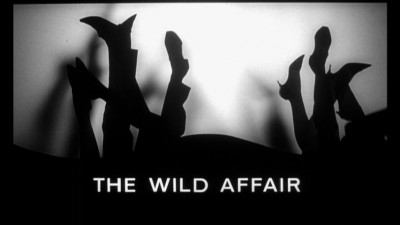
Gorgeous virgin Marjorie Lee (Nancy Kwan) has a secret: she doesn't want to be a virgin. She's getting married to knob Andy (Donald Churchill), and that means--because it's 1963 at the movies--that she has to quit the job she loves and be a respectable wife. Well...her last day at the office coincides with the annual office Christmas party (that's "Winter Solstice conference and workshop" for my P.C. friends), and since it's 1963 at the movies, "office Christmas party" equals no holds barred drinking and f******. So, Marjorie confers with her creepy alter ego "Sandra" in her vanity mirror, who tells Marjorie to put on a sexy dress and have some guy at the office nail her and get it over with already. Wait--what's that you say? Who's Sandra? Oh, right: Majorie has another personality inside her, a "creature" of sexuality that thinks Marjorie a coward when it comes to having "fun." Marjorie's mum (Bessie Love) sees the warning signs of Marjorie's rebellion, but there's nothing she can do: Marjorie is going to get down at that party, and that's that--after all, didn't Andy have his stag do the previous night? Arriving at Beatrice Dawson Perfume, Regent Street, London, where Majorie has worked since she was 16, she meets older, lonely co-worker Mavis Cook (Betty Marsden), flamboyant make-up artist Quentin (Victor Spinetti), grouchy wag Tiny Hearst (Paul Whitsun-Jones), and straight-up bitch Monica (Joyce Blair), who's having an affair with the head boss, ex-Navy man Godfrey Deane (Terry-Thomas). When handsome overseas sales rep Craig (Jimmy Logan) makes it obvious he wants to have, um...lunch with Marjorie, "Sandra" says, "Do it," particularly after Quentin makes over Marjorie with the new "Vampire Look." But Marjorie somehow can't seem to let herself go with Craig anymore than she could earlier with Mr. Deane, when he pawed her in his office. As the office party starts to gear up, it's time for everyone to say their private goodbyes to Marjorie as the liquor starts flowing and the workers begin pairing off. Will Marjorie do what "Sandra" tells her to do? Or will she be a "good" girl and embrace a cold, sterile, living death called marriage marry Andy?
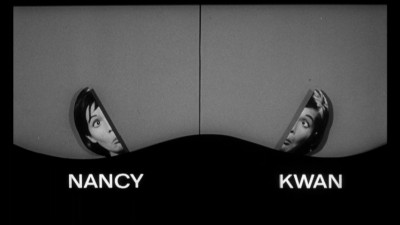
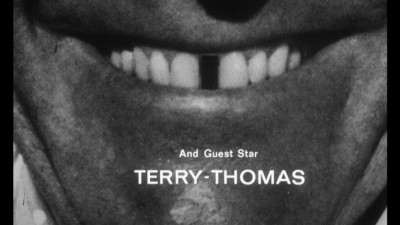
Prior to this disc arriving, The Wild Affair was just another title on Terry-Thomas' resume that I hadn't yet seen (so many of his lesser-known 1960s European projects are still unavailable over here on disc). So, being a big fan of T-T, I was curious to see why this movie, with top-billed name actress Nancy Kwan attached, as well, is so little known over here. I know even less about the British author William Sansom, who wrote the novel, The Last Hours of Sandra Lee, upon which The Wild Affair was based, but according to a few things I've found, the novel was apparently quite a bit darker and much more downbeat than the movie (info on The Wild Affair is scarce. Halliwell's of course has a citation, and Schuerer, too--who hated it--while the only new DVD review I could find was unintentionally hilarious: "Demands are made on every woman by every man, each of them operating under an unspoken understanding that their individual fetishes should be catered to. But the women disagree and, as it turns out, they've always disagreed, and The Wild Affair wasn't afraid to say so." Jesus we are doomed as a culture...). Reading a review like that, and seeing how critics today take one movie or TV show and say, "Ah, ha--that's how it was back then!" (Mad Men is a particularly egregious example of that today), I'm more and more convinced after decades and decades of watching and studying and writing about movies, that even the most tentative efforts to use a movie--particularly a fictionalized commercial product like The Wild Affair--as a means to concretely extrapolate out how a time period "really was back then," is a foolhardy exercise, at the minimum. Did women quit their jobs when they got married back in 1963? Yes...and just as many kept them (for economic reasons, for personal satisfaction, for lots of reasons). Did bosses and male co-workers sexually harass women in the office? Of course they did...and just as many and more didn't. Did well-educated, middle-class virgins like Margorie back then struggle with their internalized sexuality--the sexuality that was at odds with how society said a "good girl" should act back then? Sure...and a lot of women no doubt slept around without guilt, or with guilt, or with a combination of both. Or didn't sleep around at all before marriage. Drawing on movies like The Wild Affair to make sweeping generalizations and absolutes about societal morays and behaviors from 50 years back is, in short, ridiculous.
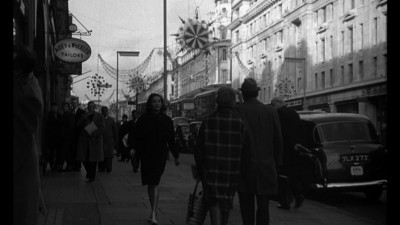
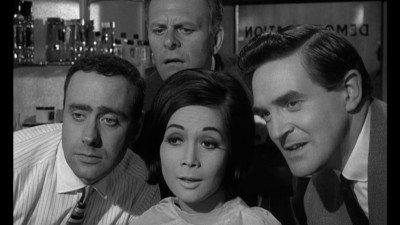
That being said...god do I miss those drunken grab-ass office parties that everyone had back then. Everyone (you didn't know that was a set-up?). Seriously, though, The Wild Affair's framework of an increasingly crocked, increasingly frenzied Christmas party, coupled with Margorie's last day at the office, gives the movie a nicely built-in suspense mechanism that amps up the tension over whether Marjorie "will" or "won't," as we go through her pushme-pullyou emotions. Just having that framework, however, isn't the equal of doing something meaningful or artful with it, and that's where The Wild Affair becomes problematic. There are so many good elements and individual scenes that work well in The Wild Affair, it's just a shame they're not pulled together into a whole that's more cohesive and meaningful. Initially, it's fairly diverting to see director Krish (The Man Who Had Power Over Women, Decline and Fall... of a Birdwatcher) fracture the screen with sharp jump cuts between Marjorie and "Sandra," alternately trading jabs and encouragement as Marjorie struggles with what she wants to do versus what she's expected to do when it comes to sex, love, and marriage. Nancy Kwan, who's startlingly fresh and beautiful here, does exceedingly well with these scenes; listen to her softly growl to "Sandra"/herself in a mirror, "No one has ever guessed your secret...no one has ever seen the creature you keep locked up in that frail, young, beautiful body. No one has ever known Sandra, the woman deep inside you,--a potent moment of quietly frustrated eroticism for a movie that one just assumes is going to be a loud, broad Terry-Thomas sex farce. It's a nicely-shaded performance right from the get-go, and it grabs you, with Kwan's expressive, animated face able to convey a variety of conflicting emotions in the span of just a few seconds (when she's interacting with a hung-over Andy before leaving for work, she's loving, embarrassed, sexually turned-on when she sees what she's doing to him by making him wait, morally conflicted, annoyed, and irritated with his hypocrisy, since he had his little party--his one last night of "freedom"--and now he doesn't want her to go to her Christmas/farewell party. All of this is achieved by Kwan with very little if any dialogue).
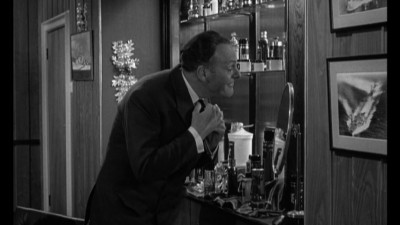
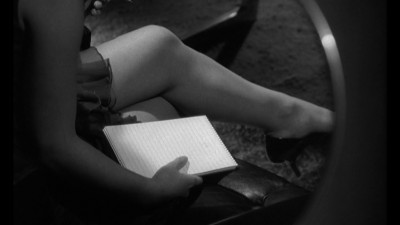
The script (also by Krish) is fair, too, in spreading around some telling insight when it comes to the frustrations of the other women working at Beatrice Dawson Perfume, as they're either pawed at or leered at...or ignored. Kwan's lonely friend Marsden is hopelessly in love with philandering, dense T-T, but she can only admit it when she's drunk, becoming truly mortified when she realizes how she's let her usual cynical, sardonic, all-knowing facade down for everyone to see...only to rouse herself proudly after a good cry, and carry on (Marsden doesn't play it safe here; she's alternately funny, pathetic, and even a bit silly and repulsive). Krish presents old-timer Gladys Morgan--as opposite a physical specimen to Kwan as you could possibly have on the screen--as the office scrubwoman, and lets us understand she was right where Kwan was many years before (she snorts at the youth of today who think they invented sex--there was plenty of it around when she was a girl, even in her own house, but she kept herself "decent"). We even feel sorry for the office bitch, Blair, when we hear how wretched she sounds, begging T-T for just one evening sleep-over, which of course he bats away, stating his wife and boys will miss him (Kwan quite rightly pities her, passing on insulting back the more-than-deserving Blair, because Blair already hates herself so much for what she's settled for in life).
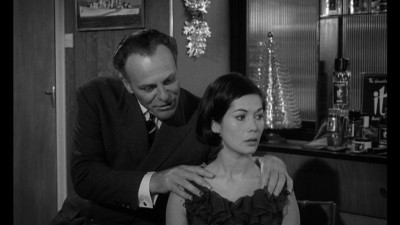
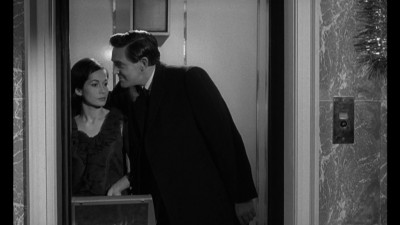
These individual scenes--aided enormously by the pro actors--work well as revealing character study snippets. However, the overall reveal of Marjorie is fuzzy at best, because Krish refuses to comment on the material, either visually or thematically. The Wild Affair's visual schematic doesn't get any more complicated or "deep" than those zippy but relatively straight-forward crosscuts between Marjorie and "Sandra." While the party scenes are superficially busy, there's no relevant information in the mise-en-scene. And that's acceptable, I suppose (although a pity, because there's so much that could have been done in terms of spatial relationships or production design and lighting)...if I can at least get some idea of where the director/screenwriter stands with his characters. Unfortunately, there's a big silence in The Wild Affair when you listen for what the director has to say here, which is strange because there are so many potential fields to explore. One of the biggest dropped balls occurs right at the finale, when David Sumner's married Ralph character happily exclaims his wife has given birth to a little girl, with all his co-workers, including Marjorie, ecstatically jumping around and cheering--considering how Krish has spent the last 90 minutes showing how women are manhandled, stalked, fondled, and harassed by every guy in pants, the director/screenwriter couldn't offer up one tiny little bit of caustic irony with this birth announcement, instead of going for simple-minded sentimentality?).
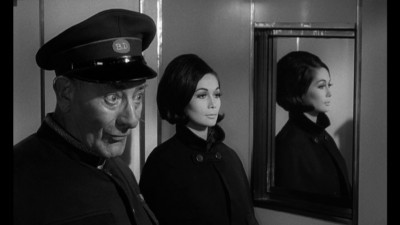
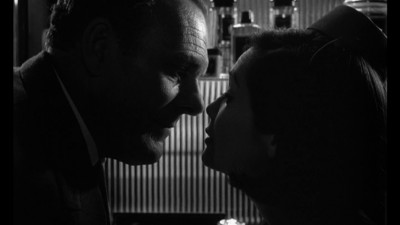
Never mind the fact that a couple of critical supporting characters, such as T-T, are left not only unexplored but completely devoid of motivation. We never learn who T-T really is or why he does what he does (Godfrey Deane is just another incarnation of T-T's well-worn charming rotter character), nor do we get a judgment call on his behavior: one minute he's basically buying Kwan for proposed sexual services when he gives a full Christmas bonus only to her; then he's blowing off his mistress; then he's laughing and joking with the lonely woman who loves him, and then he's making faces for the camera. Forget those other characters for a moment; what's really troubling here is: what is The Wild Affair trying to say about Margorie? If it has nothing to say about why she feels and acts the way she does...then why are we watching her meaningless struggle? And if the movies does have a viewpoint...why is it deliberately obscured, or ameliorated? Does she really want to let loose the sexual "creature" within her? If so...why does she keep chickening out when she has the chance? Either way: can the script or director give us some insight into that choice? Why does she see precisely what kind of insufferable dolt she's marrying...and then run into his arms at the end of the movie like a little child? Why the sudden conservative turnabout/sellout to her independence, punctuated by the bad "joke" about her smacking her bottom when she ran at him and fell on the ground...with Andy replying, "Well, that saves me the trouble!"? So now she needs to be spanked by Andy like a little girls who's been bad? Was she scared of her own sexuality? Did the wantonness of the party sicken her, or make her feel empty inside? Or was it her simple, ethical, "clean" morality that never left her (and thus made Sandra completely illogical)? You better guess at those questions, not because The Wild Affair is trying to be "grown up," letting us decide what's what (it's clearly not that artful or well thought-out), but rather because it simply doesn't seem to know itself. And that's a shame, because all the groundwork is so promising....
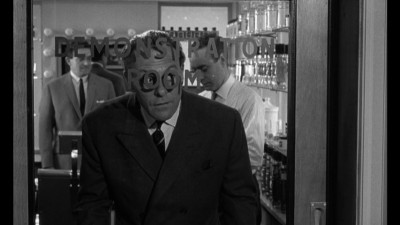
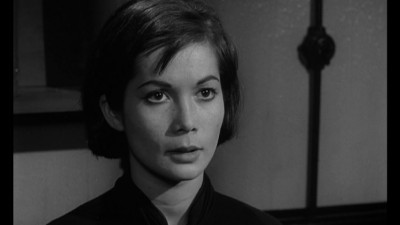
The Video:
The anamorphically-enhanced, 1.66:1 widescreen black and white transfer for The Wild Affair is quite sharp, with decent blacks and solid contrast. Plenty of dirt marks and scratches, though--but not distracting.
The Audio:
The Dolby Digital English mono audio track occasionally dropped and recovered its levels, but overall, it's acceptable, with low hiss. No subtitles.
The Extras:
No extras.
Final Thoughts:
The Wildly Promising Affair. There's a skilled, subtle--and quite charming--performance by Nancy Kwan in The Wild Affair; it's just too bad she didn't have a director/screenwriter who could bring some sense to this sometimes enlightening but ultimately frustrating and hands-off (heehee) tale of a young woman's battle between her own sexuality, her sense of freedom...and the terrifying, crushing death that's known as "marriage" (just kidding, Mrs. Mavis...). An interesting miss, but I'm still recommending The Wild Affair to lovers of anything British from the sixties (count me in that group), for Kwan's spot-on performance.
Paul Mavis is an internationally published movie and television historian, a member of the Online Film Critics Society, and the author of The Espionage Filmography.


|
| Popular Reviews |
| Sponsored Links |
|
|
| Sponsored Links |
|
|
| Release List | Reviews | Shop | Newsletter | Forum | DVD Giveaways | Blu-Ray | Advertise |
|
Copyright 2024 DVDTalk.com All Rights Reserved. Legal Info, Privacy Policy, Terms of Use,
Manage Preferences,
Your Privacy Choices | |||||||












